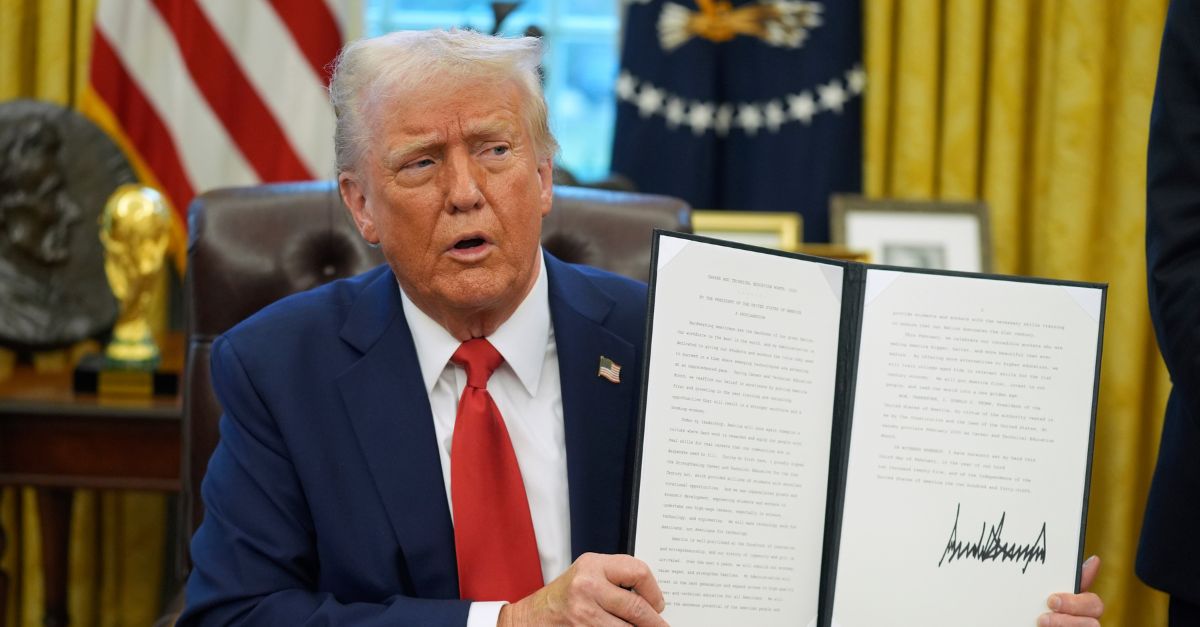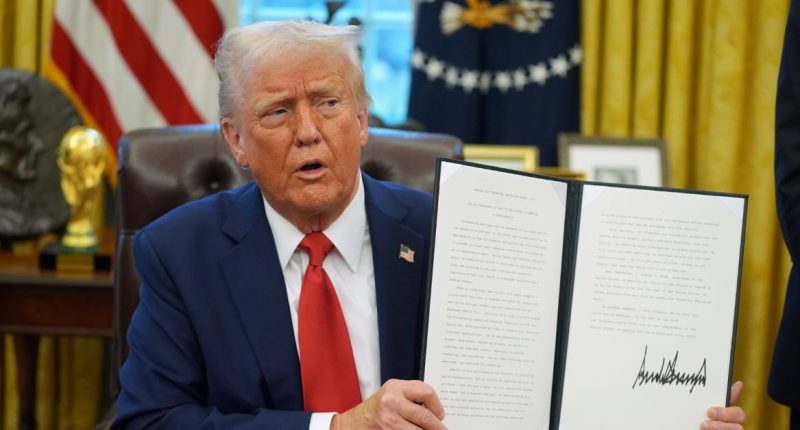
President Donald Trump holds up a signed executive order in the Oval Office of the White House, Monday, Feb. 3, 2025, in Washington (AP Photo/Evan Vucci).
A federal judge in Washington, D.C., on Monday said she was “inclined” to issue a temporary restraining order blocking the Trump administration from implementing a policy that would freeze funding on distributions to federal aid programs, effectively extending the administrative stay she put in effect last week.
U.S. District Judge Loren AliKhan appeared to reject the Justice Department’s contention that the plaintiffs’ case was moot after a controversial memo issued by the White House Office of Management and Budget (OMB) last week ordering the freeze was rescinded, reasoning that the directives contained therein were still being implemented across federal agencies.
The OMB memo, which was sent out Jan. 28, stated the following (bold in original):
[T]o the extent permissible under applicable law, Federal agencies must temporarily pause all activities related to obligation or disbursement of all Federal financial assistance, and other relevant agency activities that may be implicated by the executive orders, including, but not limited to, financial assistance for foreign aid, nongovernmental organizations, DEI, woke gender ideology, and the green new deal.
The measure caused mass confusion throughout entities dependent on the federal government for funding. Multiple lawsuits were filed and AliKhan on Jan. 29 stopped the measure from going into effect and ordered an expedited hearing on the matter.
AliKhan’s order came in response to a lawsuit filed by the National Council of Nonprofits (NCN), the largest network of nonprofit organizations in North America.
The administration responded to the myriad legal actions by issuing a follow-up memorandum rescinding the prior one.
“OMB Memorandum M-25-13 is rescinded. If you have questions about implementing the President’s Executive Orders, please contact your agency General Counsel,” the second memo stated.
During Monday’s hearing, the DOJ argued that the plaintiff’s case was moot, as OMB had rescinded the memo at the heart of the lawsuit, explaining that guidance had been issued directing federal agencies not to rely on the memo. The attorney, Daniel Schwhy, also claimed that any funding freezes still in place were due to individual federal agencies “exercising their own discretion” to comply with a flurry of executive orders signed by President Donald Trump during his first week in office.
The DOJ went on to argue that none of the plaintiffs in the case could prove that the pause in their funding was related to the OMB memo as opposed to one of Trump’s executive orders. However, when AliKhan asked whether the DOJ could specify which executive order or orders were responsible for cutting off funding to the plaintiffs, Schwhy said he could not.
AliKhan responded by telling him that “seems like a problem of your own making,” signaling early on in the hearing that she did not think the rescission of the OMB memo meant the plaintiffs’ case was moot.
The DOJ further argued that OMB was the wrong agency to be party to the proceedings, claiming that OMB merely provided guidance while other federal agencies ultimately made the decisions about funding.
At one point, Schwhy also conceded that OMB rescinded its memo after it became “a sideshow.”
The plaintiffs’ attorney, Kevin Friedl, argued that, despite the memo rescission, the policy it instituted was still in place. That policy, he argued, was exceedingly broad and included the freezing of entire platforms and portals used by recipients of the funds at issue, indicating there was not “any kind of selective decision-making” to ensure that the executive orders were being followed.
Additionally, the plaintiffs’ attorney asserted that the funding freezes only began after the OMB memo was issued and emphasized that none of his clients should have fallen within the scope of the executive orders.
“There are freezes that just can’t be explained by the executive orders,” Friedl told the court, specifically mentioning that one of his clients, a clinic for people with disabilities, stopped getting funding immediately after the OMB memo.
As the hearing drew to a close, AliKhan said she was “leaning in favor” of finding that the plaintiffs’ case was not moot, saying that people had no access to funding portals as recently as Sunday evening.
The plaintiffs provided the court with proposed language for the restraining order and AliKhan gave the DOJ three hours to respond. She said she wanted to make sure she issued an order on the matter before her administrative stay expired at 5 p.m. Monday.
A federal judge in Rhode Island on Friday also issued a restraining order blocking the administration from implementing the funding freeze after similarly rejected the mootness argument.
“The Defendants now claim that this matter is moot because it rescinded the OMB Directive,” the Friday order from U.S. District Judge John McConnell stated. “But the evidence shows that the alleged rescission of the OMB Directive was in name-only and may have been issued simply to defeat the jurisdiction of the courts. The substantive effect of the directive carries on.”







